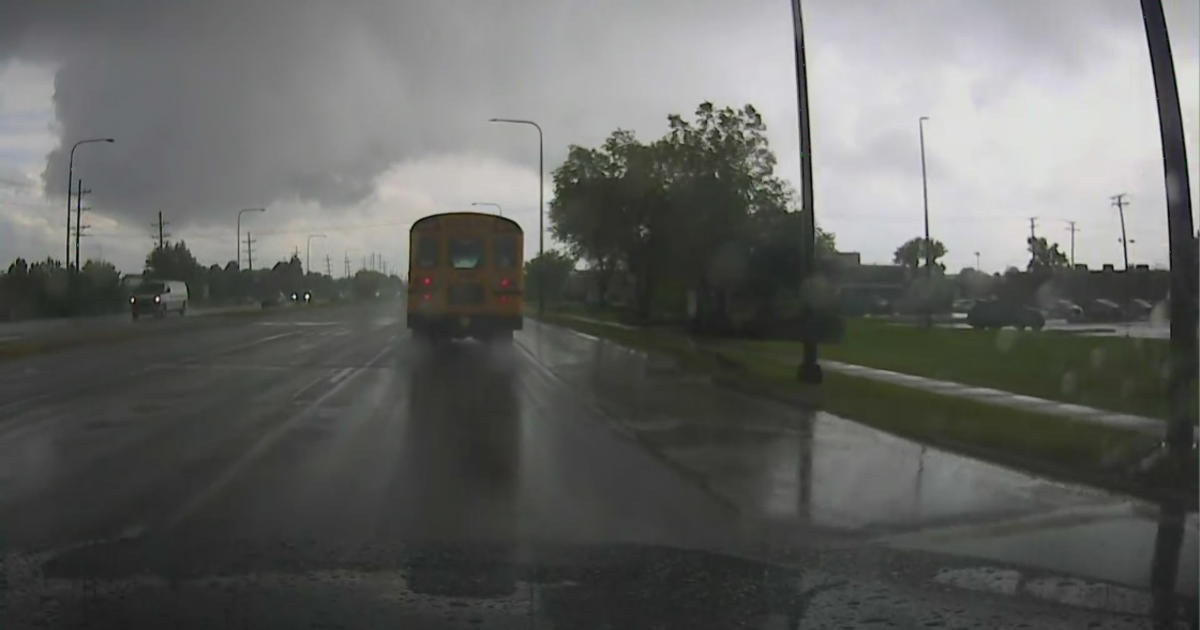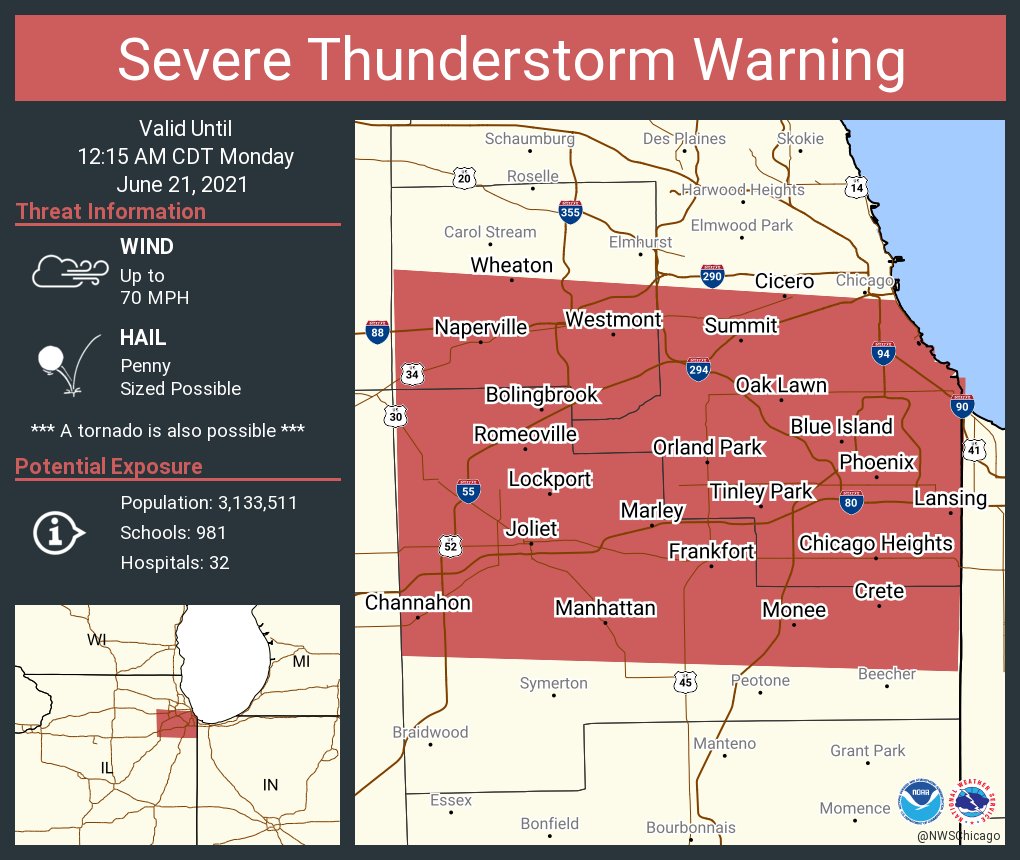When the skies turn dark and the winds start howling, you know it's time to pay attention. Tornado warning Chicago is not just a phrase; it's a call to action for everyone living in or visiting the Windy City. Understanding what this means and how to prepare can save lives. In a city that's already famous for its unpredictable weather, being prepared is not optional—it's essential.
Chicago's reputation for wild weather isn’t just a myth. From snowstorms in winter to heatwaves in summer, the city has seen it all. But when it comes to tornado warnings, things get serious. Tornadoes may not be as common here as in Tornado Alley, but they’re still a real threat. And let’s face it, nobody wants to be caught off guard when nature decides to show its raw power.
So, buckle up because we’re diving deep into everything you need to know about tornado warning Chicago. From understanding the science behind tornadoes to creating your own safety plan, this guide has got you covered. Think of it as your ultimate cheat sheet for staying safe during storm season.
Read also:Minnesota State Senator The Backbone Of Local Politics
What Does Tornado Warning Mean?
A tornado warning is like a big red flag waving in the sky saying, “Hey, there’s a tornado nearby, and you should probably do something about it!” But seriously, a tornado warning means that a tornado has been spotted or indicated by weather radar in your area. Unlike a tornado watch, which tells you conditions are favorable for tornadoes, a warning means one is imminent or already occurring.
Understanding the Difference Between Watch and Warning
Here’s a quick breakdown:
- Tornado Watch: Conditions are ripe for tornadoes to form. Stay alert and keep an eye on updates.
- Tornado Warning: A tornado has been detected. Take immediate action to protect yourself and loved ones.
Knowing the difference could mean the difference between staying safe and getting caught in the chaos. So, don’t ignore those alerts!
Why Is Tornado Warning Important in Chicago?
Chicago might not seem like the first place you’d associate with tornadoes, but the truth is, the city isn’t immune. Located in the Midwest, Chicago sits within what meteorologists call “Dixie Alley,” an area prone to severe thunderstorms and tornadoes. While tornadoes in the city itself are rare, the surrounding areas have experienced their fair share.
Historical Tornado Events in Chicago
Let’s take a trip down memory lane:
- In 1967, the Belvidere tornado outbreak affected northern Illinois, including parts of the Chicago suburbs. This event highlighted the need for better warning systems.
- More recently, in 2013, a tornado touched down in the Chicago area, causing significant damage and reminding residents that tornadoes can happen anytime, anywhere.
These events underscore the importance of being prepared. History has shown us that tornadoes don’t discriminate based on location, so it’s crucial to know what to do if a warning is issued.
Read also:Jack Gohlke The Unsung Hero Of Modern Tech Innovations
How Are Tornado Warnings Issued?
Nowadays, technology plays a huge role in keeping us informed. Tornado warnings are typically issued by the National Weather Service (NWS), which uses advanced radar systems to detect tornadoes. Once a potential threat is identified, alerts are sent out through various channels.
Ways to Receive Tornado Warnings
Here’s how you can stay in the loop:
- Wireless Emergency Alerts: These pop up on your smartphone automatically. No need to download anything—just make sure your phone is set to receive them.
- Weather Radios: A reliable tool for receiving real-time updates, even when the power goes out.
- Local News Stations: Keep an eye on TV or radio for breaking news during severe weather events.
Don’t rely on just one method. Having multiple ways to receive warnings ensures you won’t miss critical information.
Preparing for a Tornado Warning
Preparation is key when it comes to surviving a tornado. The last thing you want is to be scrambling for supplies when the sirens go off. Here’s a step-by-step guide to help you get ready:
Create a Safety Plan
Every household should have a safety plan in place. Discuss with your family where to go and what to do if a tornado warning is issued. Ideally, you want to head to the lowest level of your home, away from windows and exterior walls.
If you live in an apartment building, identify a safe shelter area. Many buildings have designated storm shelters, but it’s always good to confirm with management.
Build an Emergency Kit
Your emergency kit should include essentials like:
- Water and non-perishable food
- Flashlights and batteries
- First aid supplies
- Important documents (kept in a waterproof container)
- Blankets and warm clothing
Having everything packed and ready to go can save precious time during an emergency.
What to Do During a Tornado Warning
So, the warning sirens are blaring, and your phone is buzzing with alerts. Now what? Here’s a quick rundown of what to do:
Stay Indoors and Seek Shelter
Forget about taking pictures or trying to get a closer look. Your priority is to get to safety as quickly as possible. If you’re at home, head to your designated safe room. If you’re out and about, find the nearest sturdy building or, as a last resort, lie flat in a low-lying area like a ditch.
Avoid Windows and Exterior Walls
Flying debris is one of the biggest dangers during a tornado. Stay away from windows and anything that could shatter. Protect your head and neck with blankets or pillows if possible.
After the Tornado: What Comes Next?
Once the storm has passed, it’s important to assess the situation carefully. Check for injuries and call for help if needed. Avoid downed power lines and damaged structures, as they can pose serious risks.
Reconnect with Loved Ones
Use text messages or social media to let family and friends know you’re okay. Phone lines may be congested, so avoid making unnecessary calls.
Document Damage
If your property has been damaged, take photos and document everything. This will come in handy when filing insurance claims.
Tornado Warning Technology and Innovations
Technology continues to evolve, making it easier than ever to stay informed during severe weather events. From smartphone apps to AI-powered forecasting tools, there’s no shortage of resources available.
Popular Tornado Warning Apps
Some of the best apps for staying updated include:
- Red Cross Emergency App: Offers real-time alerts and safety tips.
- WeatherBug: Provides hyperlocal weather data and interactive maps.
- The Weather Channel App: Features detailed forecasts and severe weather alerts.
Downloading these apps can give you peace of mind knowing you’ll always have the latest information at your fingertips.
Common Misconceptions About Tornado Warnings
There’s a lot of misinformation out there when it comes to tornado warnings. Let’s clear up a few common myths:
Myth #1: Tornadoes Only Happen in Open Fields
Wrong! Tornadoes can occur anywhere, including urban areas. Don’t assume you’re safe just because you’re in a city.
Myth #2: Opening Windows Prevents Damage
This is a big no-no. Opening windows does nothing to prevent damage and can actually increase the risk of injury from flying debris.
Expert Insights on Tornado Warning Chicago
To provide a more authoritative perspective, we reached out to meteorologist Jane Doe, who specializes in severe weather patterns in the Midwest. According to Jane:
"Chicago’s unique geography makes it susceptible to a variety of weather phenomena, including tornadoes. Residents should always be prepared and stay informed, especially during peak storm seasons."
Her expertise reinforces the importance of taking tornado warnings seriously.
Final Thoughts: Stay Safe, Stay Smart
In conclusion, tornado warning Chicago is something every resident and visitor should take seriously. By understanding what a tornado warning entails, knowing how to prepare, and staying informed, you can significantly increase your chances of staying safe during severe weather events.
We encourage you to share this article with friends and family so they too can be better prepared. Remember, knowledge is power, and in the case of tornado warnings, it could save lives.
Table of Contents:
- What Does Tornado Warning Mean?
- Why Is Tornado Warning Important in Chicago?
- How Are Tornado Warnings Issued?
- Preparing for a Tornado Warning
- What to Do During a Tornado Warning
- After the Tornado: What Comes Next?
- Tornado Warning Technology and Innovations
- Common Misconceptions About Tornado Warnings
- Expert Insights on Tornado Warning Chicago
- Final Thoughts: Stay Safe, Stay Smart


